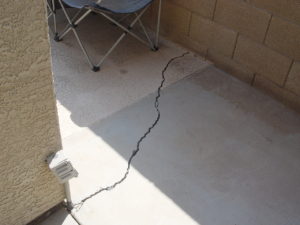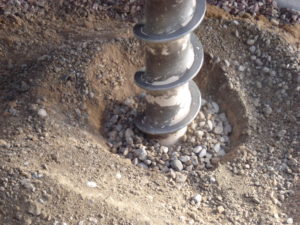What is Forensic Geotechnical Engineering?
Geotechnical engineering is a branch of civil engineering that deals with the behavior of earthen materials and how they interact with man-made elements such as foundations, flatwork, or pipelines. Issues that geotechnical engineers may be asked to evaluate include the suitability of potential construction sites, how the soils at the site will behave in their native state or when they are reworked as fill, the ease with which soil and/or rock can be excavated, or if materials at a site are able to support the proposed construction.
We cover a wide area across the Southwest. We currently have offices in Arizona and New Mexico. We are frequently referred by structural engineers and geotechnical engineers in both Arizona and New Mexico.
What Do We Do?
Peterson Geotechnical Group specializes in forensic geotechnical evaluations. Typically, this includes studying and diagnosing the cause of movement that has led to cracks, separations, and other types of distress in relatively newer buildings. Our evaluations typically culminate with written reports of our findings, opinions, and repair recommendations for the project. Common issues that may arise that a forensic geotechnical analysis can help with include:
- Damages Resulting From Water Loss
- Structure Analysis Related to Foundation or Soil Movement
- Moisture Intrusion
- Drainage & Flooding
- Expansive Soils
- Collapsible & Compressible Soils
- Retaining Wall Failures
- Asphalt Pavement Distress and Settlement
- Tripping Hazards From Concrete Flatwork Cracking & Vertical
- Offsets
- Corrosion to Concrete & Masonry
We are frequently called upon to help diagnose the causes of foundation cracks or movement, settlement and to offer recommendations for stabilizing and repairing the affected structures.
If you are in Arizona, New Mexico or any area throughout the Southwest and are in need of slab repair or inspection, contact us today.
Field Sampling and Laboratory Testing
In the course of our evaluations we frequently collect data and samples of the material at the sites. As part of our analyses, we routinely provide the following field sampling capabilities:
- Field classification and description of soils conforming to ASTM D-2488-09a
- Split barrel sampling conforming to ASTM D-1586-08a and D-1587-08
- Thick wall, ring-lined, split barrel sampling conforming to ASTM D-3550-01
- Advancement of soil borings and sampling equipment with hand samplers, truck-mounted drills and hollow stem augers, and limited-access drilling equipment
- Sand cone testing for measuring the in-place moist density of soils
- Moisture domes to test the vapor transmission rate through concrete
Laboratory testing services that we provide include:
- Determination of water content, ASTM D-2216
- Sieve Analysis, ASTM D421
- Atterberg Limits, ATM D-4318 and ASTM D-427
- Standard Proctor Compaction, ASTM D-698
- Modified Proctor Compaction, ASTM D-1557
- Consolidation, ASTM D-2435
Ready to find out more?
Contact us to see how we can help!


